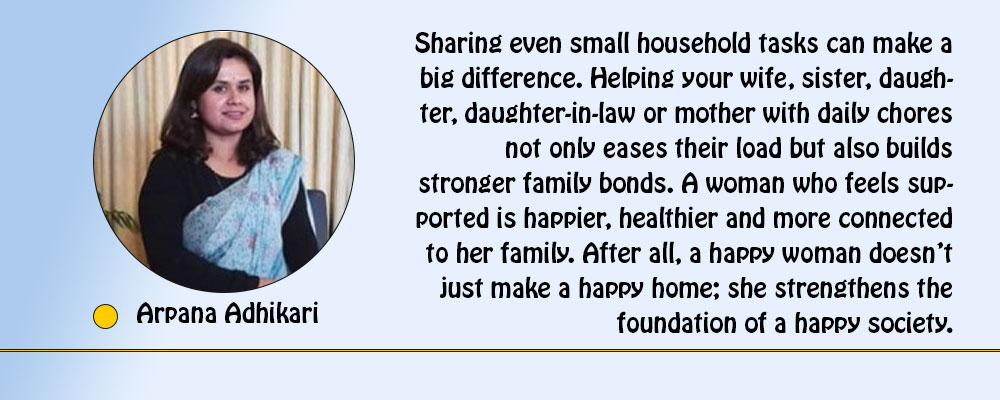- Saturday, 28 February 2026
Working Women's Woes
Women today are more educated, skilled and independent than ever before. They work diligently in offices, shoulder to shoulder with their male colleagues, and contribute significantly to their families’ financial stability. Many have proven that when given opportunities, women can excel in any professional field. However, behind this picture of progress lies a quieter, less discussed reality: the double burden most working women carry every day. Along with their office responsibilities, they continue to manage household chores, care for children and look after the elderly, often with little rest or recognition.
Pranita Sharma, 41, from Baneshwor, faces a similar situation. She works at a well-known INGO. Her day starts early, preparing breakfast, packing lunchboxes, getting her two children ready for school, and cooking snacks for her father-in-law before leaving for her office by 9:30 am. After a full day’s hectic work, she returns home around 6:30, only to start another round of chores, cooking dinner, cleaning, taking care of her kids' school assignments, and preparing for the next day. Her husband, who works at a reputed bank, helps occasionally, but most of the household responsibilities still rest on her shoulders.
During festivals like Dashain and Tihar, while men enjoy long holidays playing cards and visiting friends, women like Pranita spend their holidays in the kitchen and around the house, ensuring cultures and traditions are upheld and everyone is fed. She shared that the festival holidays no longer bring the charms that she used to feel in her childhood. Now, they are more like days of endless physical work, demanding so much effort that her back feels sore and exhaustion spikes.
Tara Basnet of Mandikhatar confronts similar challenges. A schoolteacher and mother of two, she spends her entire day standing in classrooms, teaching and managing students, only to return home to do another round of domestic duties. When exhaustion shows on her face, her in-laws criticise her for being unhappy, and her husband often joins in. Her mother, Bimala Basnet of Jorpati, worries for her daughter and often remarks that Tara is carrying a heavier load because she is educated and a working woman. Bimala frets that the real Tara - the carefree, happy person she once was - seems lost somewhere in the race to balance professional and family life.
This is not just the story of Pranita and Tara, it reflects the lives of countless working women across Nepal. On the other hand, men, in most cases, wake up, get ready, have breakfast and leave for work. Women, on the other hand, start their day earlier, cooking, cleaning, preparing meals, managing children and then rushing to work. Before even reaching the office, many women are already spent from completing piles of household tasks. Yet, they still try to appear confident and composed once they arrive at work, ready to compete with their male counterparts who begin their day fresh and rested. And after returning home from a long day's work, they continue to work until late at night. This imbalance often affects women’s performance, as they start the workday, they are already tired.
Sharing even small household tasks can make a big difference. Helping your wife, sister, daughter, daughter-in-law or mother with daily chores not only eases their load but also builds stronger family bonds. A woman who feels supported is happier, healthier and more connected to her family. After all, a happy woman doesn’t just make a happy home; she strengthens the foundation of a happy society.

















